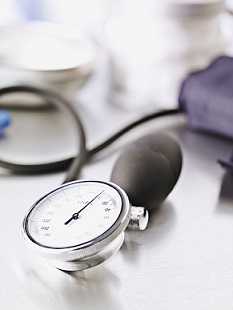Conditions that Increase Risk for Heart Disease

High blood pressure is major risk factor for heart disease. It is a condition that occurs when the pressure of the blood in the arteries is too high.
Several medical conditions can increase your risk for heart disease. If you have one of these conditions, you can take steps to control it and lower your risk.
High Blood Pressure
High blood pressure is a major risk factor for heart disease. It is a medical condition that occurs when the pressure of the blood in your arteries and other blood vessels is too high. The high pressure, if not controlled, can affect your heart and other major organs of your body, including your kidneys and brain.
High blood pressure is often called a “silent killer” because many people do not notice symptoms to signal high blood pressure. Lowering blood pressure by changes in lifestyle or by medication can reduce your risk for heart disease and heart attack.
High Cholesterol
Cholesterol is a waxy, fat-like substance made by the liver or found in certain foods. Your liver makes enough for your body’s needs, but we often get more cholesterol from the foods we eat. If we take in more cholesterol than the body can use, the extra cholesterol can build up in the walls of the arteries, including those of the heart. This leads to narrowing of the arteries and can decrease the blood flow to the heart, brain, kidneys, and other parts of the body.
Some cholesterol is “good,” and some is “bad.” High cholesterol is the term used for high levels of low-density lipoprotein, or LDL, which are considered “bad” because they can lead to heart disease. A higher level of high-density lipoprotein cholesterol, or HDL, is considered “good” because it provides some protection against heart disease.
A blood test can detect the amount of cholesterol and triglycerides (a related kind of fat) in your blood.
Diabetes
Diabetes mellitus also increases the risk for heart disease. Your body needs glucose (sugar) for energy. Insulin is a hormone made in the pancreas that helps move glucose from the food you eat to your body’s cells. If you have diabetes, your body doesn’t make enough insulin, can’t use its own insulin as well as it should, or both.
Diabetes causes sugars to build up in the blood. The risk of death from heart disease for adults with diabetes is two to four times higher than adults who do not have diabetes.1 Talk to your doctor about ways to manage diabetes and control other risk factors.
Reference
- CDC. National diabetes fact sheet: national estimates and general information on diabetes and prediabetes in the United States, 2011 [PDF- 2.6 MB]. Atlanta, GA: U.S. Department of Health and Human Services, Centers for Disease Control and Preventions, 2011.
- Page last reviewed: August 10, 2015
- Page last updated: August 10, 2015
- Content source:



 ShareCompartir
ShareCompartir